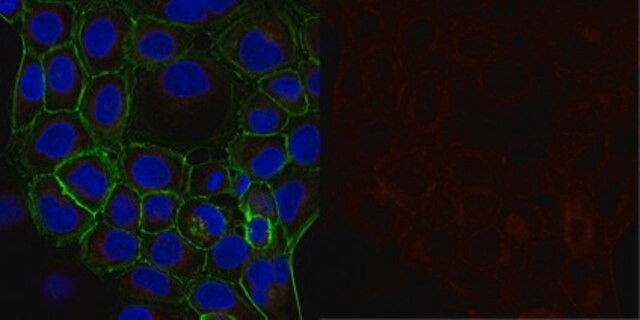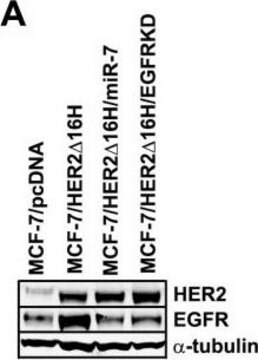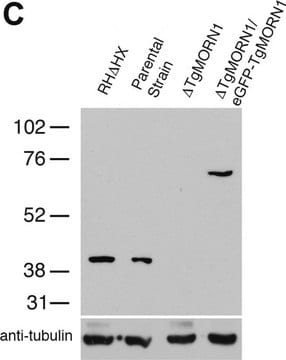16-232
Anti-α-Tubulin Antibody, clone DM1A, Alexa Fluor™ 488 conjugate
clone DM1A, Upstate®, from mouse
Synonym(s):
Alpha-tubulin 3, Tubulin B-alpha-1, Tubulin alpha-3 chain, tubulin, alpha 1a, tubulin, alpha 3, tubulin, alpha, brain-specific
About This Item
Recommended Products
biological source
mouse
Quality Level
conjugate
ALEXA FLUOR™ 488
antibody form
purified antibody
antibody product type
primary antibodies
clone
DM1A, monoclonal
species reactivity
rat, mouse, guinea pig, human, pig, bovine, avian
manufacturer/tradename
Upstate®
technique(s)
flow cytometry: suitable
immunocytochemistry: suitable
immunofluorescence: suitable
western blot: suitable
isotype
IgG1
NCBI accession no.
UniProt accession no.
shipped in
wet ice
target post-translational modification
unmodified
Gene Information
human ... TUBA1A(7846)
General description
Specificity
Immunogen
Application
2 µg/mL of a previous lot detected α-Tubulin in RIPA lysates from A431 cells.
Immunocytochemistry:
2 µg/mL of a previous lot showed positive immunostaining for α-Tubulin in HeLa cells.
Quality
Flow Cytometry:
0.2 μg of this lot detected α-Tubulin in fixed and permeabilized rat L6, Jurkat, and A431 cells.
Target description
Physical form
Liquid at 2-8°C.
Storage and Stability
Do Not Freeze. Do not store the material diluted.
For maximum recovery of product, centrifuge original vial prior to removing cap.
Analysis Note
Negative Control: Catalog # 16-240, Normal Mouse IgG, Alexa Fluor™ 488-conjugate.
Other Notes
Legal Information
Not finding the right product?
Try our Product Selector Tool.
Storage Class Code
12 - Non Combustible Liquids
WGK
WGK 2
Flash Point(F)
Not applicable
Flash Point(C)
Not applicable
Certificates of Analysis (COA)
Search for Certificates of Analysis (COA) by entering the products Lot/Batch Number. Lot and Batch Numbers can be found on a product’s label following the words ‘Lot’ or ‘Batch’.
Already Own This Product?
Find documentation for the products that you have recently purchased in the Document Library.
Customers Also Viewed
Articles
Flow cytometry dye selection tips match fluorophores to flow cytometer configurations, enhancing panel performance.
Flow cytometry dye selection tips match fluorophores to flow cytometer configurations, enhancing panel performance.
Troubleshooting guide offers solutions for common flow cytometry problems, ensuring improved analysis performance.
Troubleshooting guide offers solutions for common flow cytometry problems, ensuring improved analysis performance.
Protocols
Learn key steps in flow cytometry protocols to make your next flow cytometry experiment run with ease.
Explore our flow cytometry guide to uncover flow cytometry basics, traditional flow cytometer components, key flow cytometry protocol steps, and proper controls.
Explore our flow cytometry guide to uncover flow cytometry basics, traditional flow cytometer components, key flow cytometry protocol steps, and proper controls.
Learn key steps in flow cytometry protocols to make your next flow cytometry experiment run with ease.
Our team of scientists has experience in all areas of research including Life Science, Material Science, Chemical Synthesis, Chromatography, Analytical and many others.
Contact Technical Service












